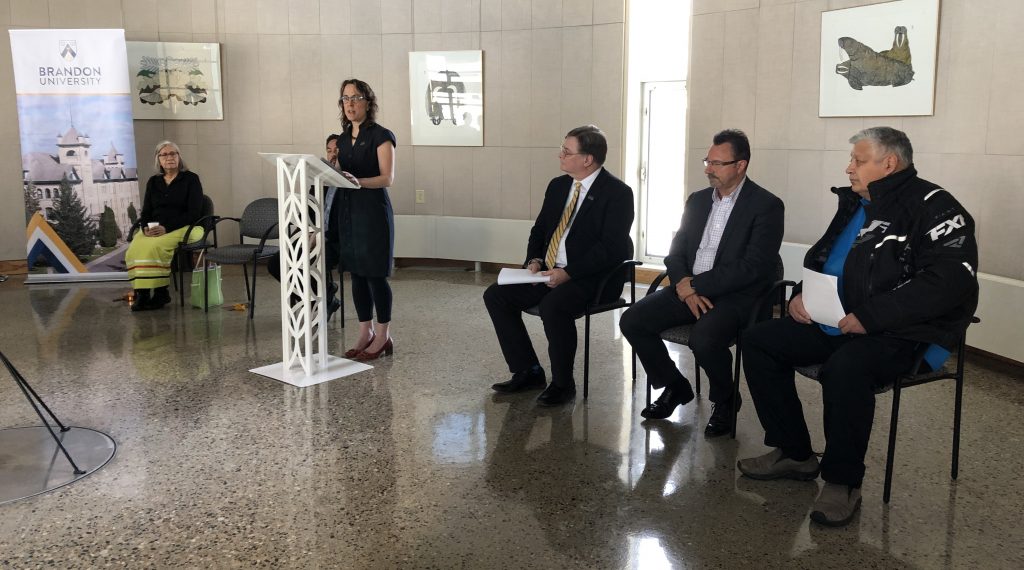Brandon University report highlights economic potential of urban reserves
 March 1, 2019
March 1, 2019
Source: Brandon University News
Urban reserves in Manitoba hold great potential for both First Nations communities and municipalities, according to a groundbreaking report released by Brandon University’s Rural Development Institute (RDI).
The report, Indigenous Contributions to the Manitoba Economy, was formally unveiled earlier this year, and explores Indigenous economic impact in detail. A local launch held today at Brandon University’s He Oyate Tawapi room focused on the Indigenous impacts in western Manitoba, as well as the potential identified in the report for urban reserves.
“The report shows urban reserves are a powerful strategy for growth on First Nations,” said Bill Ashton, director of RDI. “Urban reserves provide job opportunities for First Nations people, particularly those living off-reserve. We found that 69% of First Nations people in southern Manitoba live off reserve. As well, urban reserves are an opportunity for remote First Nations to set up businesses in locations with a larger customer base. Surrounding municipalities benefit too. The First Nation pays for municipal services on the urban reserve, and urban reserve workers pay property taxes and spend money in the urban centre whenever they are living and shopping off reserve.”
Currently, there are eight urban reserves in Manitoba: four in the North and four in the South. They host a wide range of businesses including gas bars, convenience stores, VLT lounges, cannabis stores, hotels, grocery stores, and office space.
As the report details, the success of existing urban reserves help Indigenous people make an enormous contribution to the province’s economy. Total spending by Indigenous people in Manitoba is calculated at $9.3 billion in the year 2016, contributing 3.9% to the provincial GDP — more than sectors like manufacturing or hospitality.
While Indigenous people, who make up 18% of Manitoba’s population, already contribute a major amount to Manitoba’s economy, there is potential for even more. The Indigenous population is young and growing. In Brandon, for example, 23% of children aged 14 and under identify as Indigenous. Jobs on urban reserves provide an opportunity for skills development for Indigenous youth living off reserve, who may face barriers to employment.
“Our youth are our greatest resource, but they need opportunities,” said Chief David LeDoux of Gambler First Nation. Gambler is one of 10 First Nations in the province in the process of converting land into a total of 17 new urban reserves. “Urban reserves are an opportunity for us to earn our own revenues which we can then re-invest back into the community in the form of health services, education, social and cultural programming, housing, and infrastructure. The Anishinaabe mindset is that we must plan for seven generations into the future. To do that, we need to have self-sufficiency and self-determination, to have the freedom to invest in language programming, skills development, and more for our young people.”
RDI partnered with the Southern Chiefs’ Organization Inc. (SCO) and Manitoba Keewatinowi Okimakanak Inc. (MKO) to produce the report. Researchers from SCO and MKO interviewed leaders from seven First Nations about their urban reserves, including their ingredients for success, challenges they’d faced, and their future development plans. For the first time with this report, RDI gathered data and conducted research and analysis in accordance with the First Nations principles of Ownership, Control, Access and Possession (OCAP).
“This project truly highlights Brandon University’s strengths as an institution, especially our long commitment to working with Indigenous communities,” said Brandon University Interim President Dr. Steven Robinson. “One of Brandon University’s most important roles is sharing our knowledge, and this project is the perfect example of bi-directional knowledge sharing. We gladly took the opportunity to learn from Indigenous communities and to benefit from their input in shaping our research. Together, we have produced a report that gives a comprehensive overview of Indigenous economic impact today, as well as giving clear direction for the future.”
The partnerships that helped bring the report together are similar to the partnerships that can help unlock a prosperous future for all Manitobans.
“This project was an opportunity for relationship-building and working together. Urban reserves provide that same opportunity for municipalities and First Nations,” Ashton said. “Relationship-building is at the heart of reconciliation.”
The full report, Indigenous Contributions to the Manitoba Economy, can be accessed online at BrandonU.ca/RDI/Projects/Indigenous-Economy.

![]() June 25, 2024
June 25, 2024







![]() June 25, 2024
June 25, 2024![]() June 19, 2024
June 19, 2024![]() June 19, 2024
June 19, 2024![]() June 18, 2024
June 18, 2024
![]() March 3, 2019
March 3, 2019
![]() March 2, 2019
March 2, 2019
![]() March 1, 2019
March 1, 2019
![]() March 1, 2019
March 1, 2019
![]() March 1, 2019
March 1, 2019